- Home
- FPMT Homepage
Foundation for the Preservation of the Mahayana Tradition
The FPMT is an organization devoted to preserving and spreading Mahayana Buddhism worldwide by creating opportunities to listen, reflect, meditate, practice and actualize the unmistaken teachings of the Buddha and based on that experience spreading the Dharma to sentient beings. We provide integrated education through which people’s minds and hearts can be transformed into their highest potential for the benefit of others, inspired by an attitude of universal responsibility and service. We are committed to creating harmonious environments and helping all beings develop their full potential of infinite wisdom and compassion. Our organization is based on the Buddhist tradition of Lama Tsongkhapa of Tibet as taught to us by our founders Lama Thubten Yeshe and Lama Thubten Zopa Rinpoche.
- Willkommen
Die Stiftung zur Erhaltung der Mahayana Tradition (FPMT) ist eine Organisation, die sich weltweit für die Erhaltung und Verbreitung des Mahayana-Buddhismus einsetzt, indem sie Möglichkeiten schafft, den makellosen Lehren des Buddha zuzuhören, über sie zur reflektieren und zu meditieren und auf der Grundlage dieser Erfahrung das Dharma unter den Lebewesen zu verbreiten.
Wir bieten integrierte Schulungswege an, durch denen der Geist und das Herz der Menschen in ihr höchstes Potential verwandelt werden zum Wohl der anderen – inspiriert durch eine Haltung der universellen Verantwortung und dem Wunsch zu dienen. Wir haben uns verpflichtet, harmonische Umgebungen zu schaffen und allen Wesen zu helfen, ihr volles Potenzial unendlicher Weisheit und grenzenlosen Mitgefühls zu verwirklichen.
Unsere Organisation basiert auf der buddhistischen Tradition von Lama Tsongkhapa von Tibet, so wie sie uns von unseren Gründern Lama Thubten Yeshe und Lama Thubten Zopa Rinpoche gelehrt wird.
- Bienvenidos
La Fundación para la preservación de la tradición Mahayana (FPMT) es una organización que se dedica a preservar y difundir el budismo Mahayana en todo el mundo, creando oportunidades para escuchar, reflexionar, meditar, practicar y actualizar las enseñanzas inconfundibles de Buda y en base a esa experiencia difundir el Dharma a los seres.
Proporcionamos una educación integrada a través de la cual las mentes y los corazones de las personas se pueden transformar en su mayor potencial para el beneficio de los demás, inspirados por una actitud de responsabilidad y servicio universales. Estamos comprometidos a crear ambientes armoniosos y ayudar a todos los seres a desarrollar todo su potencial de infinita sabiduría y compasión.
Nuestra organización se basa en la tradición budista de Lama Tsongkhapa del Tíbet como nos lo enseñaron nuestros fundadores Lama Thubten Yeshe y Lama Zopa Rinpoche.
A continuación puede ver una lista de los centros y sus páginas web en su lengua preferida.
- Bienvenue
L’organisation de la FPMT a pour vocation la préservation et la diffusion du bouddhisme du mahayana dans le monde entier. Elle offre l’opportunité d’écouter, de réfléchir, de méditer, de pratiquer et de réaliser les enseignements excellents du Bouddha, pour ensuite transmettre le Dharma à tous les êtres. Nous proposons une formation intégrée grâce à laquelle le cœur et l’esprit de chacun peuvent accomplir leur potentiel le plus élevé pour le bien d’autrui, inspirés par le sens du service et une responsabilité universelle. Nous nous engageons à créer un environnement harmonieux et à aider tous les êtres à épanouir leur potentiel illimité de compassion et de sagesse. Notre organisation s’appuie sur la tradition guéloukpa de Lama Tsongkhapa du Tibet, telle qu’elle a été enseignée par nos fondateurs Lama Thoubtèn Yéshé et Lama Zopa Rinpoché.
Visitez le site de notre Editions Mahayana pour les traductions, conseils et nouvelles du Bureau international en français.
Voici une liste de centres et de leurs sites dans votre langue préférée
- Benvenuto
L’FPMT è un organizzazione il cui scopo è preservare e diffondere il Buddhismo Mahayana nel mondo, creando occasioni di ascolto, riflessione, meditazione e pratica dei perfetti insegnamenti del Buddha, al fine di attualizzare e diffondere il Dharma fra tutti gli esseri senzienti.
Offriamo un’educazione integrata, che può trasformare la mente e i cuori delle persone nel loro massimo potenziale, per il beneficio di tutti gli esseri, ispirati da un’attitudine di responsabilità universale e di servizio.
Il nostro obiettivo è quello di creare contesti armoniosi e aiutare tutti gli esseri a sviluppare in modo completo le proprie potenzialità di infinita saggezza e compassione.
La nostra organizzazione si basa sulla tradizione buddhista di Lama Tsongkhapa del Tibet, così come ci è stata insegnata dai nostri fondatori Lama Thubten Yeshe e Lama Zopa Rinpoche.
Di seguito potete trovare un elenco dei centri e dei loro siti nella lingua da voi prescelta.
- 欢迎 / 歡迎
简体中文
“护持大乘法脉基金会”( 英文简称:FPMT。全名:Foundation for the Preservation of the Mahayana Tradition) 是一个致力于护持和弘扬大乘佛法的国际佛教组织。我们提供听闻,思维,禅修,修行和实证佛陀无误教法的机会,以便让一切众生都能够享受佛法的指引和滋润。
我们全力创造和谐融洽的环境, 为人们提供解行并重的完整佛法教育,以便启发内在的环宇悲心及责任心,并开发内心所蕴藏的巨大潜能 — 无限的智慧与悲心 — 以便利益和服务一切有情。
FPMT的创办人是图腾耶喜喇嘛和喇嘛梭巴仁波切。我们所修习的是由两位上师所教导的,西藏喀巴大师的佛法传承。
繁體中文
護持大乘法脈基金會”( 英文簡稱:FPMT。全名:Found
ation for the Preservation of the Mahayana Tradition ) 是一個致力於護持和弘揚大乘佛法的國際佛教組織。我們提供聽聞, 思維,禪修,修行和實證佛陀無誤教法的機會,以便讓一切眾生都能 夠享受佛法的指引和滋潤。 我們全力創造和諧融洽的環境,
為人們提供解行並重的完整佛法教育,以便啟發內在的環宇悲心及責 任心,並開發內心所蘊藏的巨大潛能 — 無限的智慧與悲心 – – 以便利益和服務一切有情。 FPMT的創辦人是圖騰耶喜喇嘛和喇嘛梭巴仁波切。
我們所修習的是由兩位上師所教導的,西藏喀巴大師的佛法傳承。 察看道场信息:
- FPMT Homepage
- News/Media
-
- Study & Practice
-
-
- About FPMT Education Services
- Latest News
- Programs
- New to Buddhism?
- Buddhist Mind Science: Activating Your Potential
- Heart Advice for Death and Dying
- Discovering Buddhism
- Living in the Path
- Exploring Buddhism
- FPMT Basic Program
- FPMT Masters Program
- FPMT In-Depth Meditation Training
- Maitripa College
- Lotsawa Rinchen Zangpo Translator Program
- Universal Education for Compassion & Wisdom
- Online Learning Center
-
- Prayers & Practice Materials
- Overview of Prayers & Practices
- Full Catalogue of Prayers & Practice Materials
- Explore Popular Topics
- Benefiting Animals
- Chenrezig Resources
- Death & Dying Resources
- Lama Chopa (Guru Puja)
- Lama Zopa Rinpoche: Compendium of Precious Instructions
- Lama Zopa Rinpoche: Life Practice Advice
- Lama Zopa Rinpoche Practice Series
- Lamrim Resources
- Mantras
- Prayer Book Updates
- Purification Practices
- Sutras
- Thought Transformation (Lojong)
- Audio Materials
- Dharma Dates - Tibetan Calendar
- Translation Services
- Publishing Services
- Ways to Offer Support
- Prayers & Practice Materials
-
- Teachings and Advice
- Find Teachings and Advice
- Lama Zopa Rinpoche Advice Page
- Lama Zopa Rinpoche: Compendium of Precious Instructions
- Lama Zopa Rinpoche Video Teachings
- ༧སྐྱབས་རྗེ་བཟོད་པ་རིན་པོ་ཆེ་མཆོག་ནས་སྩལ་བའི་བཀའ་སློབ་བརྙན་འཕྲིན།
- Podcasts
- Lama Yeshe Wisdom Archive
- Buddhism FAQ
- Dharma for Young People
- Resources on Holy Objects
- Teachings and Advice
-
-
*If a menu item has a submenu clicking once will expand the menu clicking twice will open the page.
-
-
- Centers
-
- Teachers
-
- Projects
-
-
-
-
*If a menu item has a submenu clicking once will expand the menu clicking twice will open the page.
-
-
- FPMT
-
-
-
-
-
Renunciation of samsara is not only the business of monks and nuns. Whoever is seeking liberation or enlightenment needs renunciation of samsara.
Lama Thubten Yeshe
-
-
-
- Shop
-
-
-
The Foundation Store is FPMT’s online shop and features a vast selection of Buddhist study and practice materials written or recommended by our lineage gurus. These items include homestudy programs, prayers and practices in PDF or eBook format, materials for children, and other resources to support practitioners.
Items displayed in the shop are made available for Dharma practice and educational purposes, and never for the purpose of profiting from their sale. Please read FPMT Foundation Store Policy Regarding Dharma Items for more information.
-
-
FPMT News Around the World
12
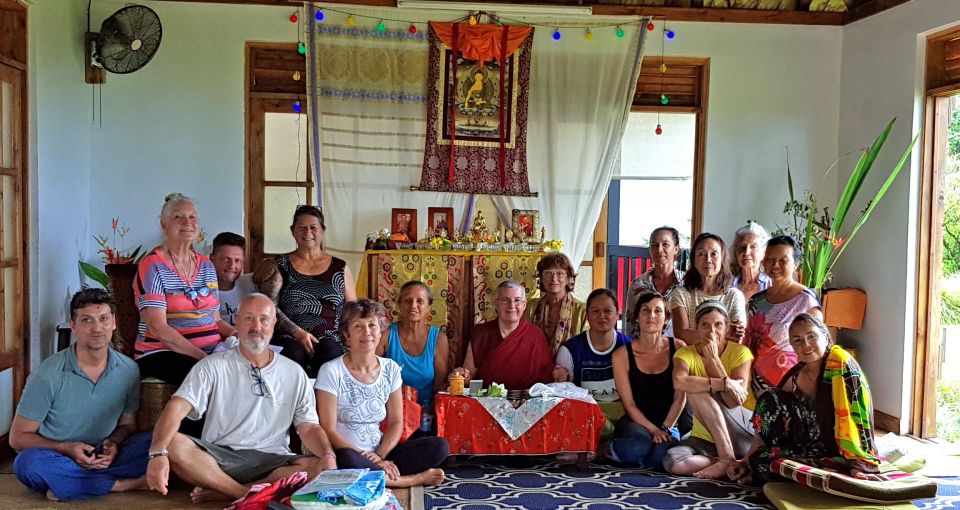
Ven. Chantal Tenzin Dekyi and retreatants, Tahiti, French Polynesia, March 2019. Photo courtesy of Centre de Méditation Naropa.
Students from Centre de Méditation Naropa (Naropa Meditation Center), the FPMT center in Papeete on the island of Tahiti, French Polynesia, hosted French nun and FPMT registered teacher Ven. Chantal Tenzin Dekyi (Chantal Carrerot) from March 13-27, 2019. Annie Green, spiritual program coordinator shares the story.
The Naropa Meditation Center invited Ven. Chantal Tenzin Dekyi to teach the Dharma in Tahiti. She came for the first time in February 2012, then came for two weeks in March 2019.
We began with a five-day retreat on calm abiding, held in a privately-owned home on Fare Mahora Point, Teahupoo, a beautiful place on the peninsula of Tahiti. Thanks to the kindness of the homeowner and the staff, we all benefited from the good conditions.
The retreat began on Friday, March 15, 2019, and ended on Thursday, March 20. Twenty-seven people came only for the weekend. Seventeen people stayed for the entire retreat.
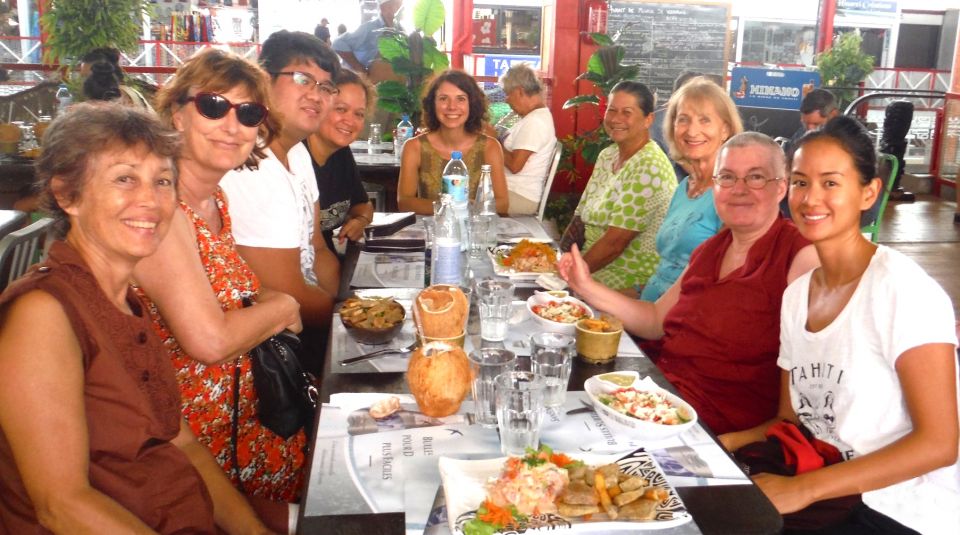
Ven. Chantal Tenzin Dekyi and students enjoying lunch at the market, Tahiti, French Polynesia, March 2019. Photo courtesy of Centre de Méditation Naropa.
The following weekend, Saturday March 23, and Sunday, March 24, Ven. Chantal Tenzin Dekyi taught “Introduction to Buddhism—Introduction to the Lamrim” at our center in Papeete. Then on Monday she taught “How to Manage Our Emotions.” We appreciated the knowledge, compassion, and joy she shared with us while teaching and and answering questions.
In French we say, “Everything comes in three.” We hope that Ven. Chantal Tenzin Dekyi will come again to spray a rain of Dharma on Tahiti for the benefit of sentient beings.
For more information about Centre de Méditation Naropa visit their website:
http://naropatahiti.over-blog.com/
FPMT.org and Mandala Publications brings you news of Lama Zopa Rinpoche and of activities, teachings, and events from over 160 FPMT centers, projects, and services around the globe. If you like what you read, consider becoming a Friend of FPMT, which supports our work.
5
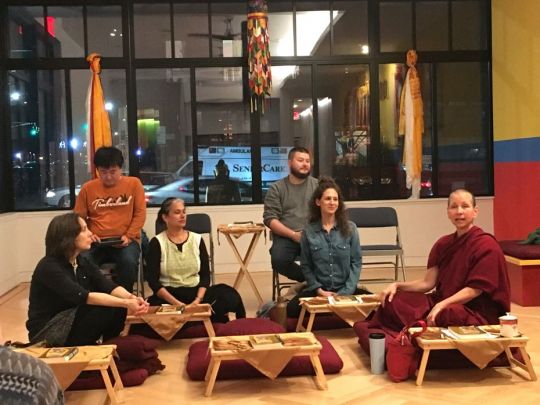
Ven. Amy Miller with students at Shantideva Center, Brooklyn, New York, US, February 2019. Photo by Jennifer Kim.
Shantideva Center, an FPMT center in Brooklyn, New York, US, celebrated Losar with FPMT registered teacher Ven. Amy Miller. Board member Jennifer Kim shares the story of the center’s ongoing connection with Ven. Amy Miller.
The students at Shantideva Center have experienced a special connection with Ven. Amy Miller for several years now. As time flies by quickly, reminding us of impermanence and the inevitability of death, Ven. Amy has been there to help ensure that our journey through this life is a good one.
It’s a bit of paradox that such an enthusiastic meditator would flourish in the noisy City of New York, and that her trips to the land of tall skyscrapers would be interspersed with her trips to the high Himalayas of Lawudo.
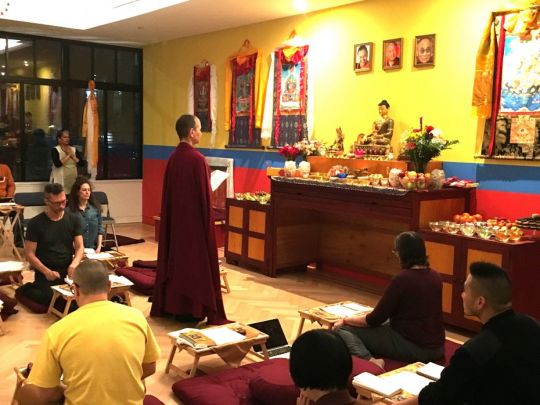
Ven. Amy Miller and students, Shantideva Center, Brooklyn, New York, US, February 2019. Photo by Jennifer Kim.
Yet somehow this arrangement has worked, with Ven. Amy sharing the deep wisdom of the Dharma in a highly practical and accessible way, touching the lives of people from all walks of life as we practice tonglen on the subways, practice patience in the office, and learn to shift our habits from Facebook to the five powers.
The last few months were a huge gift to students, as she led a variety of activities and teachings to help us understand the Dharma, accumulate merit and purify negativities. These activities culminated on Chotrul Duchen (the Day of Miracles), where we did Prostrations to the Thirty-Five Confession Buddhas; Vajrasattva purification practice; recitation of The Sutra Remembering the Three Jewels and In Praise of Dependent Arising; and the Shakyamuni Buddha Puja.
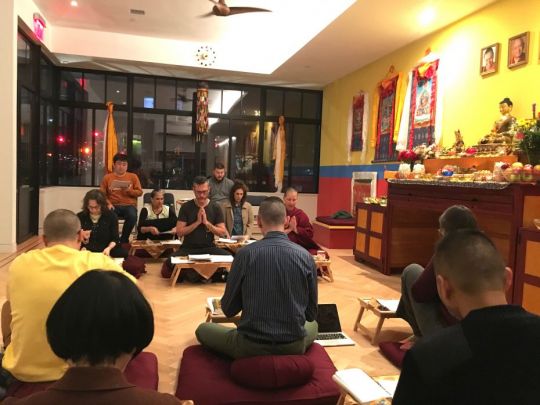
Ven. Amy Miller and students, Shantideva Center, Brooklyn, New York, US, February 2019. Photo by Jennifer Kim.
As usual, Ven. Amy helped bridge the gap between esoteric practice and meaningful relevance, helping us understand the purpose of these practices while connecting us with their powerful blessings. Her last teaching that night was a very quiet yet powerful one of selfless service, as she made the two-hour drive late at night to return home to a family member, who she has been helping to take care of.
Holidays such as the Day of Miracles allow us to reflect on the monumental impact of Shakyamuni Buddha, and teachers such as Ven. Amy allow us to receive this enlightening influence in our modern lives normally fraught with confusion. The Dharma has somehow survived due to deeply dedicated practitioners like Ven. Amy and our lineage masters, and our ability to practice is a miracle that we can truly celebrate with gratitude.
For more information about Shantideva Center, visit their website:
https://shantidevanyc.org/
FPMT.org and Mandala Publications brings you news of Lama Zopa Rinpoche and of activities, teachings, and events from over 160 FPMT centers, projects, and services around the globe. If you like what you read, consider becoming a Friend of FPMT, which supports our work.
29
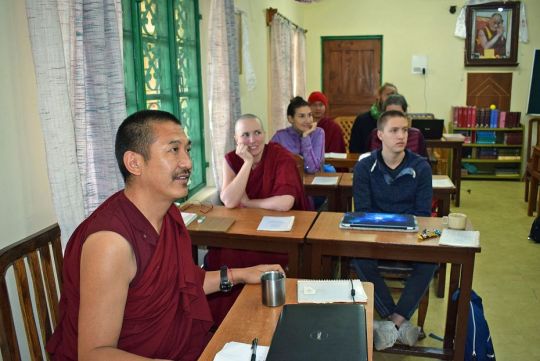
Geshe Tenzin Wangdak teaching LRZTP8 students, Lotsawa Rinchen Zangpo Translator Program, Dharamsala, India, March 2018. Photo by Alex García.
Lotsawa Rinchen Zangpo Translator Program, an FPMT project in Dharamsala, India, welcomed their newest cohort of students in March 2018. Six months later the students and teachers had the opportunity to meet with Lama Zopa Rinpoche in Dharamsala. Yaron Bahir, international director, and Filip Majkowski, local director, share news about the growth of the two-year Tibetan language translation program.
Our current cohort of students—known as LRZTP8—joined the Lotsawa Rinchen Zangpo Translator Program (LRZTP) in March 2018. LRZTP8 students have three main teachers: Geshe Tenzin Wangdak, Dr. Filip Majkowski, and LRZTP7 graduate Alex García.
Our students learn Tibetan vocabulary words used in everyday life and in Buddhism; they participate in grammar classes where new structures are introduced and explained in English and practiced in Tibetan; and they attend listening and reading comprehension classes covering Tibetan customs and traditions, environmental awareness, honorific language, human rights, and more.
Students also learn through pronunciation drilling classes; group-work; translation assignments; weekly quizzes; and end-of-module exams. Students are permitted to translate their assignments into English, Spanish, or Polish.
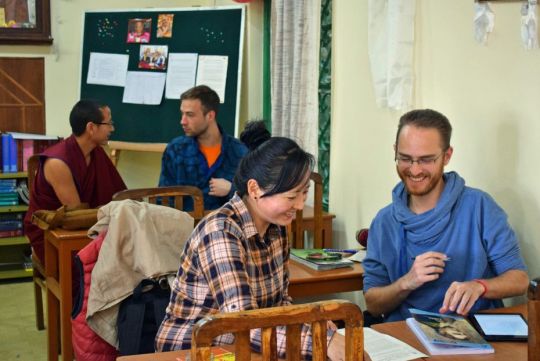
LRZTP8 students studying in the classroom at Lotsawa Rinchen Zangpo Translator Program, Dharamsala, India, March 2018. Photo by Alex García.
Each day the students learn for two hours with conversation partners, where eighty percent of the class time is made up of students speaking. Each conversation class is based on currently discussed grammar and topics, and students are provided with conversation sheets, which they can use during classes as well as for later revision.
Our beloved teacher Thubten-la guides and instructs them with his experience teaching in a one-on-one setting. Thubten-la has been working in our school since 2012. He is also the main voice of the listening comprehension materials recorded and edited by Alex García.
In addition to classes, we do our best to provide students with excellent study resources. We have been using study and exam materials from previous LRZTP courses—most notably LRZTP former teacher Franziska Oertle’s excellent book The Heart of Tibetan Language, which was published in print and online by the Library of Tibetan Works and Archives (LTWA).
We have worked hard to develop a great number of new materials, primarily for our reading and listening comprehension exercises. At the end of each module, we also give students study guides summarizing the grammar they studied in that module.
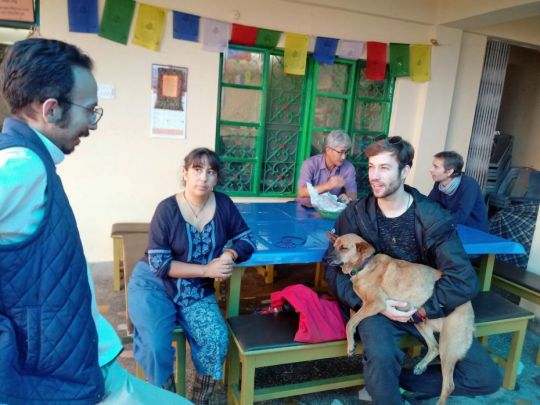
Teacher Mr. Alejandro M. Garcia, students, and dog during Wednesday Debates at Lotsawa Rinchen Zangpo Translator Program, Dharamsala, India, July 2018. Photo by Filip Majkowski.
We were very blessed that Lama Zopa Rinpoche kindly accepted our invitation to visit the school in September 2018. It was a beautiful day.
In 2018 we began collaborating with the University of Virginia (UVA) in the United States. LRZTP Tibetan teachers provided assistance to the UVA Summer Language Program so that UVA students could have online Tibetan language conversation classes with our Tibetan teachers using the video conferencing tool Zoom. This collaboration with UVA continued into the fall 2018 semester.
LRZTP8 students took their first-year final exams in March 2019. First-year final exams consist of Classical Tibetan, Speaking, and Writing. We film some of the final exams so students can assess their progress.
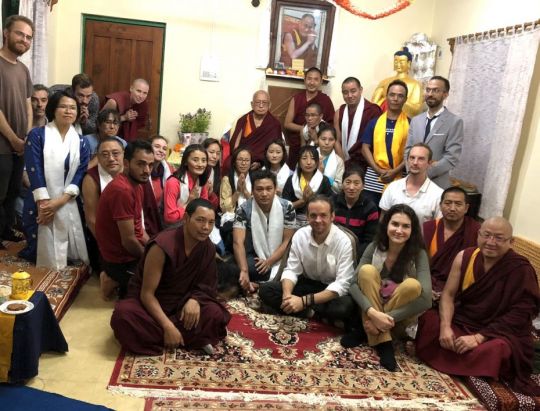
Lama Zopa Rinpoche with LRZTP8 students and teachers, Dharamsala, India, September 2018. Photo by Ven. Roger Kunsang.
In April 2019 the students of LRZTP8 started their second year of studies. This year they have all their classes taught in the Tibetan language and they study Dharma. Their intensive program began with the study of lamrim and dudra (collected topics). One day of the week is devoted to grammar revision, also with Tibetan language as a teaching medium.
In April 2019 a group of six students—two Indian nationals, one Korean, one Mexican, one Russian and one Italian—joined our two-month intensive Tibetan language for Dharma course taught by Ms. Julia Wilson, interpreter at LTWA. We would like to thank the Khyentse Foundation for a grant we were awarded that allows us to offer scholarships to Indian students who demonstrate financial need. We would also like to thank our long-term donor, one of Rinpoche’s students, who has supported LRZTP from the very beginning.
For more information about the Lotsawa Rinchen Zangpo Translator Program in Dharamsala, India visit their website:
http://www.lrztp.org
FPMT.org and Mandala Publications brings you news of Lama Zopa Rinpoche and of activities, teachings, and events from over 160 FPMT centers, projects, and services around the globe. If you like what you read, consider becoming a Friend of FPMT, which supports our work.
- Tagged: alejandro garcia, filip majkowski, franziska oertle, geshe tenzin wangdak, khyentse foundation, lotsawa rinchen zangpo translator programme, yaron bahir
22
Milarepa Center Making Strides
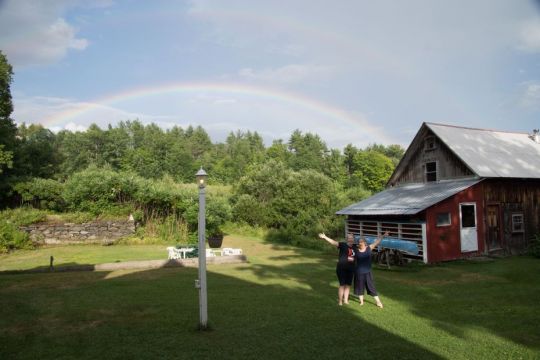
Foundation Service Seminar facilitators Sarah Brooks and Drolkar McCallum at Milarepa Center, Barnet, Vermont, US, July 2018. Photo by Dawn Holtz.
Milarepa Center is located in rural Barnet, Vermont, in the United States. In July 2018, the center hosted the Foundation Service Seminar, the ‘FPMT immersion retreat’. Milarepa Center director Dawn Holt recently shared this update.
I am happy to say that Milarepa Center is doing well after a few years of financial challenges. We have further to go, but we are making huge strides every day!
I was appointed as center director in November 2017, and since then I have of course been following the advice given to the center by our dearest, most precious spiritual director, Lama Zopa Rinpoche, for Milarepa Center to provide space for students to engage in retreat, and to offer teaching programs when possible.
With its 275 acres of pristine forest, rolling meadows, and multiple cabins on the land, Milarepa Center offers students an opportunity to conduct solitary retreat in a serene and blessed environment with no distractions.
This past year we have hosted many students from all over for private retreat, offered several public programs and retreats, upgraded a retreat cabin with a Merit Box award, and are now preparing for the arrival of His Eminence Ling Rinpoche in August! So many wonderful blessings and causes being created for Milarepa Center and the teachings to flourish, I rejoice!
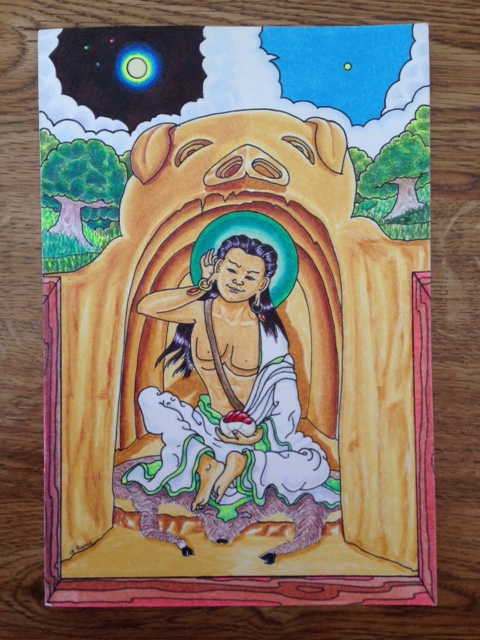
Losar card featuring Milarepa, created by LPP student Raven Jones for the Year of the Earth Pig 2019
Due to feeling a strong connection with Jetsun Milarepa, Milarepa Center has also been receiving many letters this past year from inmates in prisons all over the United States. Milarepa Center answers letters when we can and also puts inmates in contact with the Liberation Prison Project, so that they may receive additional books and study materials.
An extra bonus for the center has been the Losar (Tibetan New Year) cards we have received for the last two years created and sent to us by Raven Jones, the first person to fully complete the FPMT Masters Program while being incarcerated. In his letters to us, Raven has expressed his overwhelming respect for Jetsun Milarepa as a personal role model as well as making beautiful and most kind wishes for the center to grow and have continued success. Many inmates feel a strong connection to Milarepa as role model and as an example of the possibility of total transformation reaching all the way up to enlightenment. The letters are such a beautiful and humbling reminder of the Buddha-nature within us all.
For more on Milarepa Center, visit their website:
http://milarepacenter.org/
You can learn more about the Liberation Prison Project here:
http://www.liberationprisonproject.org/
FPMT.org and Mandala Publications brings you news of Lama Zopa Rinpoche and of activities, teachings, and events from over 160 FPMT centers, projects, and services around the globe. If you like what you read, consider becoming a Friend of FPMT, which supports our work.
15
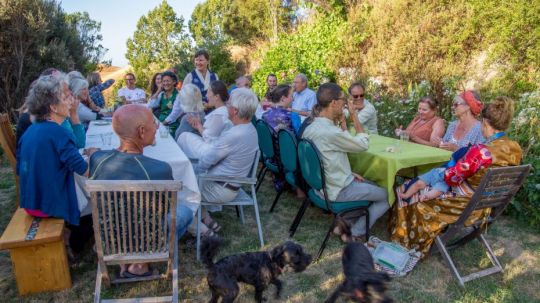
Phillipa Rutherford, center director, organizing games at the thukpa picnic on the lawn outside of Geshe Jampa Tharchin’s house at Chandrakirti Meditation Centre, Upper Moutere, New Zealand, February 2019. Photo by Sarah Brooks, spiritual program assistant.
Chandrakirti Meditation Centre, an FPMT center in Upper Moutere, New Zealand, celebrated Losar in February 2019 with three days of activities: thukpa night at their FPMT resident teacher Geshe Jampa Tharchin’s house at Chandrakirti Meditation Centre on February 3; Guru puja with tsog, breakfast, a potluck lunch, and hanging prayer flags at the center on February 5; and prayers, a picnic, and hanging prayer flags at nearby retreat property Wish Fulfilling Land on February 9. Sarah Brooks, spiritual program assistant shares the story.
The Chandrakirti family spent several days welcoming in the Year of the Earth Pig. We started the traditional Tibetan way—a couple of days before Losar—with thukpa (Tibetan noodle soup) and chubas (Tibetan dress). The delicious homemade vegetarian thukpa was prepared by volunteers and cooked by Ven. Youdon, who lives at the center.
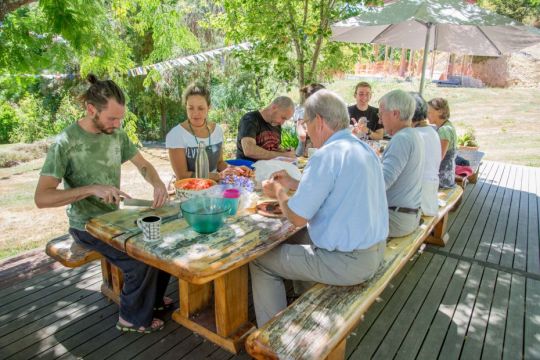
Volunteers making thukpa in the outdoor eating area at Chandrakirti Meditation Centre, Upper Moutere, New Zealand, February 2019. Photo by Sarah Brooks, spiritual program assistant.
Geshe Jampa Tharchin, our resident teacher, told the story of why thukpa is considered a very friendly food. Lama Atisha was served thukpa when he first arrived in Tibet. When Lama Atisha asked what the food was called, they told Lama Atisha the literal meaning of “thukpa”—“meeting of two”—which means two people meeting again after having met in previous lives. Lama Atisha said the meaning of the name was very good!
We also played traditional Tibetan games around the table; each person chose a piece of paper and followed the instructions—from singing a song to telling their life story. For some reason, when we all embarrass ourselves in front of each other we feel even more like family!
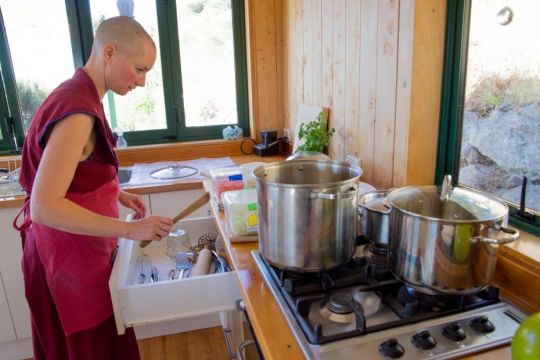
Ven. Youdon cooking thukpa in Geshe Jampa Tharchin’s kitchen at Chandrakirti Meditation Centre, Upper Moutere, New Zealand, February 2019. Photo by Sarah Brooks, spiritual program assistant.
During dessert and socializing two of the members played ukulele and sang indigenous Māori songs, including a special song for Geshe Tharchin’s long and happy life.
The day before Losar we completed our ten-day retreat on emptiness, and also prepared for the big day.
Losar itself started auspiciously with an extensive Guru Puja with tsog. Geshe Tharchin brought special Tibetan substances, including tsampa (roasted, ground barley). These substances were passed around for everyone to offer and make special wishes for the New Year.
Then everyone enjoyed a bountiful community lunch cooked by very kind volunteers. To celebrate the life of our most precious Lama Thubten Yeshe, Paul Kelly, a student of Lama Yeshe’s who had met Lama, read Lama Zopa Rinpoche’s tribute to his guru Lama Yeshe aloud to us from the 1984 issue of Wisdom magazine.
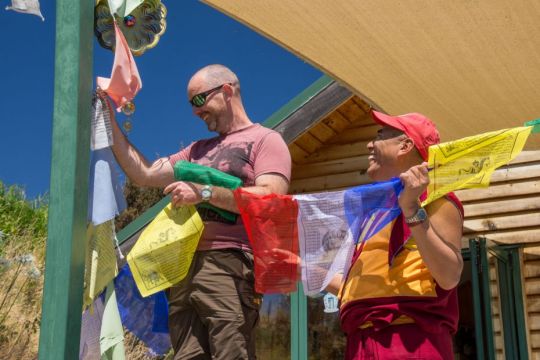
Anton Weiersmuller, center translator, and Geshe Jampa Tharchin, resident teacher, hanging prayer flags, Chandrakirti Meditation Centre, Upper Moutere, New Zealand, February 2019. Photo by Sarah Brooks, spiritual program assistant.
In the afternoon, Chandrakirti Centre volunteers hung new prayer flags all around. This created an engineering challenge, resolved with creative solutions that allowed us to get high up in the trees. All the activities were joyous and harmonious, which created an excellent way to start the year.
Three days after Losar, everyone was invited to a picnic at the Wish Fulfilling Land, a joint project of FPMT and Chandrakirti Centre providing isolated long-term retreat cabins for meditators who want to realize the lamrim.
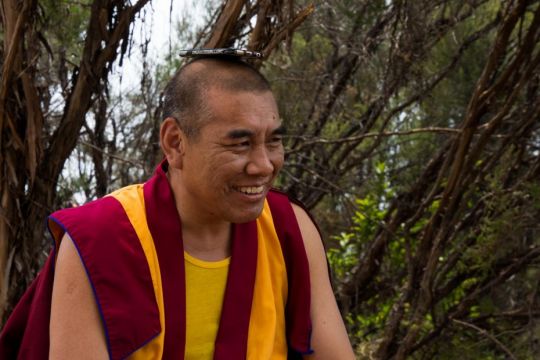
Geshe Jampa Tharchin, resident teacher, with a cell phone on his head, making everyone laugh, Wish Fulfilling Land, South Upper Moutere, New Zealand, February 2019. Photo by Sarah Brooks, spiritual program assistant.
Geshe Tharchin led the group in prayers on the site, and we shared a meal and laughter together. Geshe Tharchin said the best thing we can do is to make people’s minds happy, so relax and enjoy!
To make sure we made the most of each other’s company, everyone agreed to put their cell phones into the middle of the picnic blanket and not answer them—no matter what!
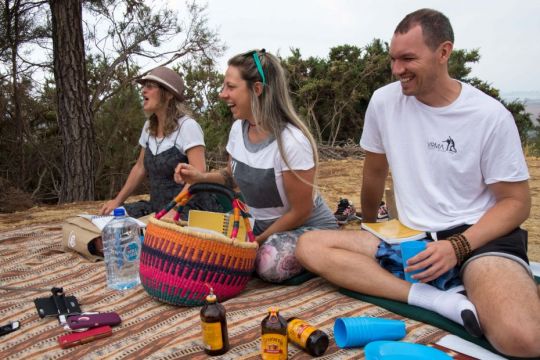
Phillipa Rutherford, Chandrakirti Meditation Centre director, Jislaine Santi, and Rafael Nami at Wish Fulfilling Land, South Upper Moutere, New Zealand, February 2019. Photo by Sarah Brooks, spiritual program assistant.
For more information about Chandrakirti Meditation Centre, visit their website:
http://www.chandrakirti.co.nz/
For more information about Wish Fulfilling Land, visit their website:
http://wishfulfillingland.nz/
FPMT.org and Mandala Publications brings you news of Lama Zopa Rinpoche and of activities, teachings, and events from over 160 FPMT centers, projects, and services around the globe. If you like what you read, consider becoming a Friend of FPMT, which supports our work.
- Tagged: chandrakirti centre, geshe jampa tharchin, losar, sarah brooks
8
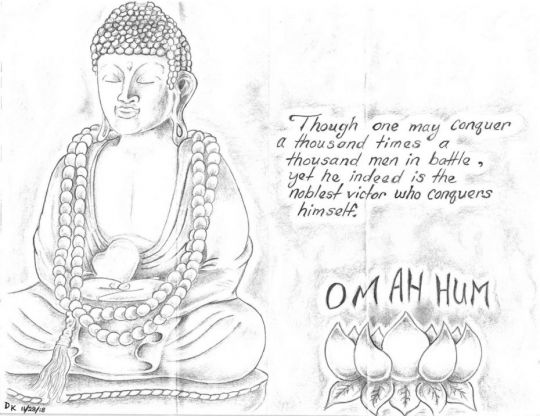
Pencil drawing made by Liberation Prison Project student Dylan and gifted to LPP, November 2018. Image courtesy of LPP.
Since 2001 Liberation Prison Project (LPP), an FPMT project, and San Francisco, California, US tour company Himalayan High Treks have been working together to enable people to go on pilgrimage. Twenty-two pilgrimages have been offered so far, raising a grand total of nearly $182,000 for LPP. Ven. Thubten Chokyi, director of LPP, shares the story.
The Buddha advised his students that after his passing, pilgrimage should be made to the holy places to help purify previously accumulated negative karmas, even the five heinous actions.
Liberation Prison Project (LPP) has been partnering with Himalayan High Treks since 2001 to organize pilgrimages to Buddhist sites in India, Nepal, Tibet, Bhutan, Myanmar, and Borobudur, a ninth-century Mahayana Buddhist temple in Indonesia. We have been blessed to have inspiring teachers leading the pilgrimages, including FPMT registered teachers Ven. Robina Courtin, Geshe Tenzin Zopa, Ven. Tenzin Chogkyi, Ven. Amy Miller, and Jon Landaw.
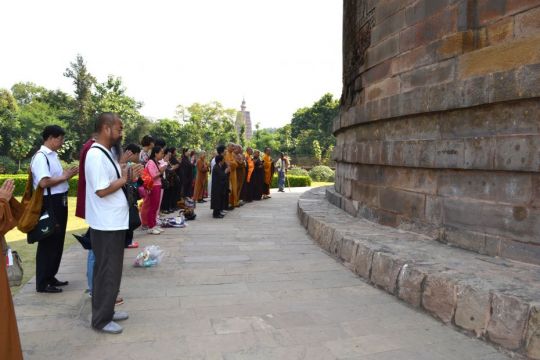
India and Nepal pilgrimage led by Jon Landaw, Dhamek Stupa, Sarnath, India, October 2012. Photo by LPP Australia office administrator Kevin Ison.
Following the pilgrimages, many participants join our team of volunteer Dharma mentors, writing to and visiting LPP students in prison. Many who go on the pilgrimages are already LPP Dharma friends who want to support LPP through the fundraising contribution. They have told us that going on pilgrimage was a transformative and powerful experience, and they are able to share that experience with the inmates they support.
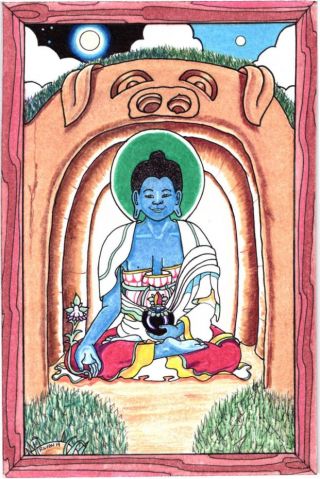
Artwork celebrating Losar, year of the pig, by Liberation Prison Project student Raven Jones, gifted to LPP, February 2018. Image courtesy of LPP.
The nearly $182,000 raised from these pilgrimages has been used to provide free resources to our students in the US, subscriptions to Mandala magazine, copies of the Liberation Tibetan calendar, and the giving of refuge and bodhichitta vows. The funds have also been used to provide support to prison chaplaincy and Dharma students who mentor our students by correspondence.
LPP has provided around 20,000 resources to inmates, including FPMT study and practice materials. All of our students receive FPMT’s five-session Buddhism in a Nutshell course when they first contact us, as an introduction to the Dharma. Many prisoners are engaged in FPMT’s fourteen-module Discovering Buddhism study program, and one student is engaged in FPMT’s most advanced study program, the Masters Program, which consists of six years of study and a total of one year of retreat. Raven Jones, one of our students in the US, has already completed the Masters Program under the mentorship of Ven. Sangye Khadro.
In late 2018 one of our students in Australia took refuge and another plans to take refuge in 2019. It is so heart warming to see the ripening of the Dharma in such harsh and challenging environments. It takes great courage and determination.
When Rangjung Neljorma Khadro Namsel Drönme (Khadro-la) was in Australia in 2014, she offered refuge to one of our students, and many of the Education and Chaplaincy staff were delighted to join in the happy occasion. The student has since completed the first thirteen modules of Discovering Buddhism and has become the first prisoner to do a nyung nä retreat in prison. He said the only major obstacle was that he couldn’t leave the fresh fruit on his altar throughout.
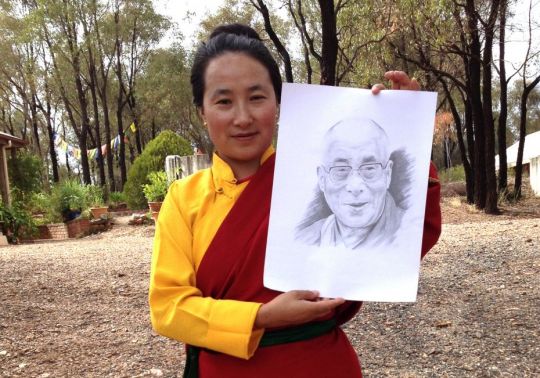
Khadro-la after her first prison visit holding a portrait of His Holiness the Dalai Lama, created by a Liberation Prison Project student on the occasion of Khadro-la’s first visit to Australia, Thubten Shedrup Ling Monastery, Bendigo, Australia, April 2014. Photo by LPP visiting chaplain Libby Mowlam. When it was presented to her Khadro-la promised to offer it directly to His Holiness.
There are many similar inspiring stories of transformation in prison that have been shared with us by LPP coordinators in New Zealand, Italy, Mongolia, Mexico, France, and the UK, and LPP students in Asia, Africa, and South America.
We appreciate Himalayan High Treks staff, as well as all of the individuals who have offered their support over the years by joining or leading a pilgrimage organized by Himalayan High Treks that benefits LPP.
For more information about Liberation Prison Project, visit their website:
http://www.liberationprisonproject.org/
For more information about Himalayan High Treks pilgrimages, visit their website:
http://www.himalayanhightreks.com/index.html
FPMT.org and Mandala Publications brings you news of Lama Zopa Rinpoche and of activities, teachings, and events from over 160 FPMT centers, projects, and services around the globe. If you like what you read, consider becoming a Friend of FPMT, which supports our work.
1
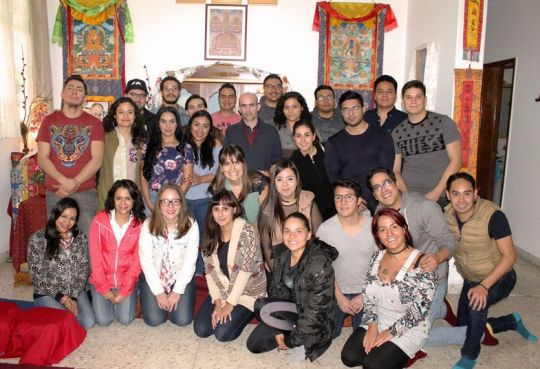
Buddhism for Young Adults group with Geshe Lobsang Dawa, Thubten Kunkyab Study Group, Mexico City, Mexico, January 2019. Photo by Ricardo Mesta Esparza.
Thubten Kunkyab Study Group, an FPMT study group in Mexico City, Mexico, has organized a Buddhism for Young Adults group that began meeting in January 2019. Buddhism for Young Adults group coordinators Nancy Torres Lopez and Ricardo Mesta Esparza, young adults themselves, share the story.
The Buddhism for Young Adults group was born from a couple members of Thubten Kunkyab Study Group in Mexico City. With the arrival of His Eminence the 7th Kyabje Ling Rinpoche to Guadalajara in September 2018, we noticed that our teachers’ precious teachings were not reaching the younger members of the population, who are developing in environments and activities that can be hostile to gaining peace and mental stillness. Our generation has grown up in a context that incites the development of negative emotions and problems that affect us both internally and externally.
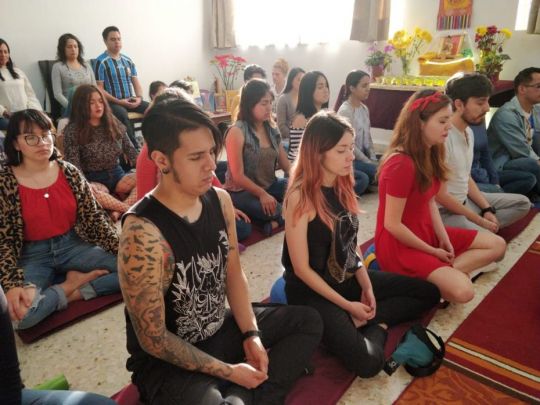
Buddhism for Young Adults group in meditation, Thubten Kunkyab, Mexico City, Mexico, February 2019. Photo by Ricardo Mesta Esparza.
Buddhism for Young Adults is a group that aspires to reach young adults between the ages of 20-35 who are interested in attending our monthly meetings to learn what the Buddhist psychology point of view has to say about contemporary social problems, and learn different tools to transform our minds.
Our long-term goal is to promote charitable practices both for the individual as well as for the community through love and compassion for all beings.
The meetings are guided by Geshe Lobsang Dawa, an FPMT registered geshe, who we are very lucky to have in Mexico City as a teacher.
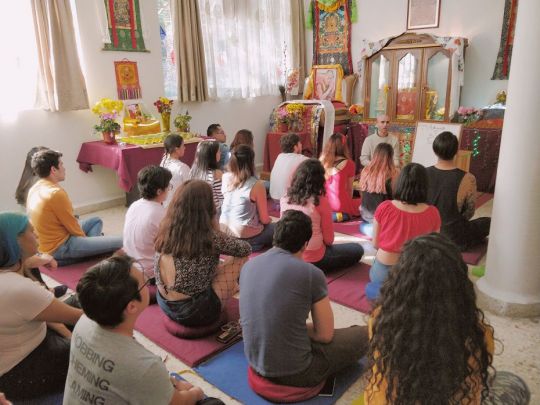
Buddhism for Young Adults group with Geshe Lobsang Dawa, Thubten Kunkyab Study Group, Mexico City, Mexico, February 2019. Photo by Ricardo Mesta Esparza.
We got so many young adults to come by, opening an exclusive space for them. And then we talked about problems that we are all concerned about in a way that appeals to lay people but from a Buddhist perspective. This has been quite interesting since it has awakened Dharma seeds in the minds of some of the young adults, who are now asking for introductory programs.
We also paid for advertisements on Instagram. We can see that there is a great interest in Dharma, but sometimes young people don’t know where to go and where they can receive teachings.
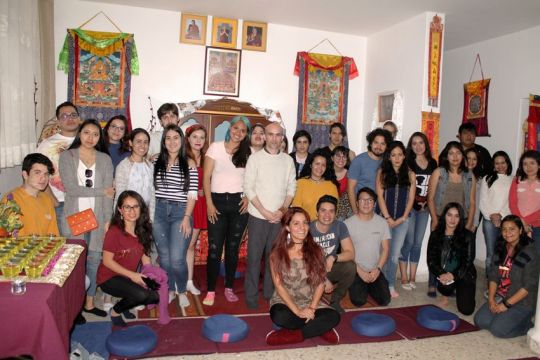
Buddhism for Young Adults group with Geshe Lobsang Dawa, Thubten Kunkyab Study Group, Mexico City, Mexico, February 2019. Photo by Ricardo Mesta Esparza.
In our first session we learned about stress: the physical, emotional, and mental sickness that afflicts us in our daily lives. We saw that rather than learn how to manage it, we choose to avoid and ignore it.
The second session was about managing depression and anxiety—sicknesses that afflict a big portion of the population—and how we do not know how to deal with it.
The turnout has been great with over forty young adults attending the group, and even one young woman started attending our lamrim study group. Rejoice!
To learn more about Thubten Kunkyab Study Group, visit their website:
https://www.meditacdmx.org/
Lama Zopa Rinpoche is the spiritual director of the Foundation for the Preservation of Mahayana Tradition (FPMT), a Tibetan Buddhist organization dedicated to the transmission of the Mahayana Buddhist tradition and values worldwide through teaching, meditation, and community service.
24
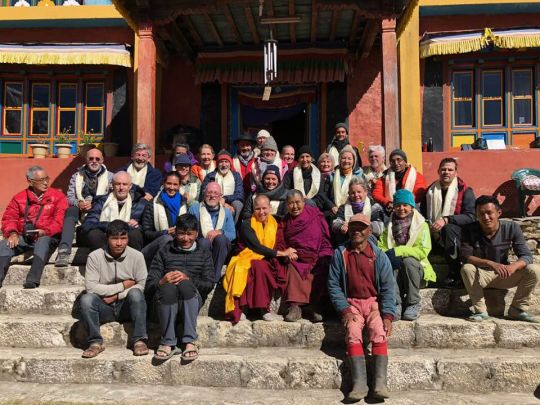
Ani Ngawang Samten, Ven. Amy Miller, and trip participants at Lawudo, Solu Khumbu, Nepal, October 2018. Photo courtesy of Ven. Amy Miller.
Venerable Amy Miller, an FPMT registered teacher, has been informally leading people to Lawudo in Nepal’s Solu Khumbu District since 1990. She shares about the October 5-22, 2018, trip she led for twenty-three people from around the world. This is a short excerpt from Ven. Amy Miller’s published online story, “An Adventurous Trip to Lawudo in Nepal.”
It was only a week before our journey to Lawudo, when my sister called me from England and mentioned how much she admired what I was undertaking—leading a group of twenty-three people up to a remote retreat center in Solu Khumbu District in the Mt. Everest region of Nepal.
When I hung up the phone, I realized I had been in denial about what we were planning to do. Of course the trip was well planned, thought-out, and supported, but when traveling to a high elevation in a remote area with incredibly challenging terrain, dire things can happen.
I swallowed my trepidation and forged ahead, landing in Nepal on September 28, 2018. I wanted to be rested and bright-eyed for the group’s arrival on October 5.
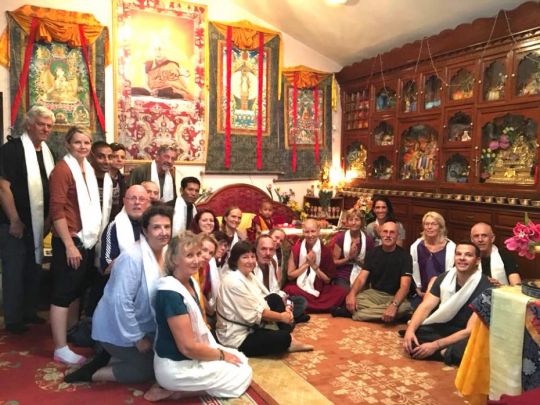
Tenzin Rigsel Rinpoche with Ven. Amy Miller and trip participants, Kopan Monastery, Kathmandu, Nepal, October 2018. Photo courtesy of Ven. Amy Miller.
We converged at Khachoe Ghakyil Ling Nunnery (Kopan Nunnery) for dinner. Our group came from Australia and Wales, from points all over the United States, from North and South America, and Europe, and they penetrated deep into my heart.
Within a week we were family, helping each other in a variety of ways: listening to each other’s coughs, passing around diarrhea remedies, tissues, and advice about the toilets. We shared laughs and compared our lifestyles that were incredibly varied. We were nurses and teachers; paramedics; mental health workers; yoga instructors; husbands and wives; mothers, fathers, and grandparents; nuns; aspiring yogis and yoginis; massage therapists; healers; retired civil rights workers; administrators; cleaners; and human beings who had an urge to explore and test the outer edges of the envelope, and reach this place called “Lawudo.”
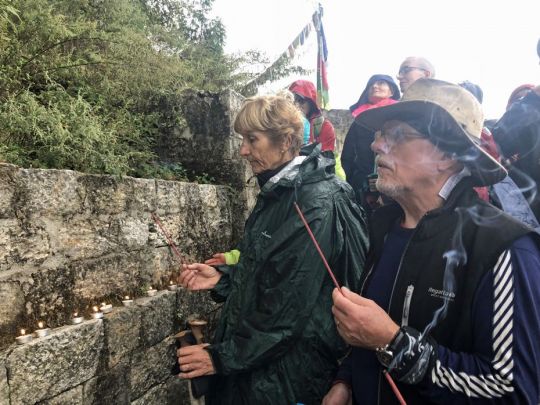
Trip participants making offerings to a naga tree outside of Lukla, Nepal, October 2018. Photo by Ven. Amy Miller.
For more information about Ven. Amy Miller, visit her website:
http://amymiller.com
Read Ven. Amy Miller’s online story, “An Adventurous Trip to Lawudo in Nepal,” and view a video she made of a previous trip:
https://fpmt.org/mandala/in-depth-stories/an-adventurous-trip-to-lawudo-in-nepal/
FPMT.org and Mandala Publications brings you news of Lama Zopa Rinpoche and of activities, teachings, and events from over 160 FPMT centers, projects, and services around the globe. If you like what you read, consider becoming a Friend of FPMT, which supports our work.
- Tagged: lawudo, nepal, solu khumbu, ven. amy miller
17
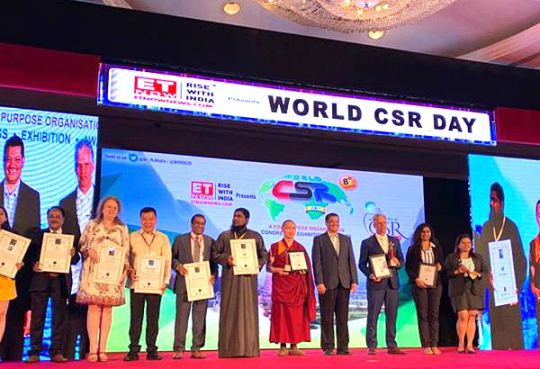
Geshe Tenzin Zopa and fellow World CSR Day award recipients, Mumbai, India, February 2019. Photo courtesy of Geshe Tenzin Zopa.
Geshe Tenzin Zopa, an FPMT touring teacher, was awarded the Global Peace Leadership and Excellence Award by World CSR (corporate social responsibility) Day organizers on the occasion of World CSR Congress’s eighth annual celebration of World CSR Day on February 18, 2019. The one-day World Peace Congress—held in conjunction with World CSR Congress—was held at hotel Taj Lands End in Mumbai, India. The mission of World Peace Congress is to bring together experts with solutions to major issues occurring in our personal lives, homes, schools, businesses, and communities.
World Peace Congress staff created a shortlist of candidates for the award. Final award decisions were made by a jury comprised of Dr. R. L. Bhatia, Founder of World CSR Day and World Sustainability; Dr. Saugata Mitra, Chief People Officer and Group Head HR, Mother Dairy Fruit & Vegetable Pvt. Ltd; Professor Indira Parikh, President of Antardisha, and India’s Iconic HR Leader; Dr. Arun Arora, Ex-President and CEO, The Economic Times, and Chairman, Edvance Pre-schools Pvt. Ltd; and Dr. C. M. Dwivedi, Group Chief Human Resource Officer, Fazlani Group of Companies; as well as juries located in each candidate’s geographic region.
Stephanie Brennan, FPMT Australia national education coordinator shares the story.
On February 18, 2019—the eve of Chotrul Duchen and the completion of Monlam Chenmo—Geshe Tenzin Zopa was awarded the prestigious Global Peace Leadership and Excellence Award in Mumbai, India.
The World Peace Congress brought together citizens from over 130 countries to celebrate leaders who are building a better society and a more peaceful world. A global jury of leaders from the fields of sustainable development, education, and world peace chose Geshe Tenzin Zopa for the award in recognition of his leadership and contributions to society.
Geshe Tenzin Zopa was invited to give a presentation “Peace as a Purposeful Goal and Sustainable Peace Effort.” He spoke of the need for secular ethics to be taught in our educational institutions, our interconnectedness, the need to cherish others, universal responsibility, and the need to develop love and compassion. He said His Holiness the Dalai Lama can inspire us to see that individuals can resolve problems, and how we can all contribute to global peace.
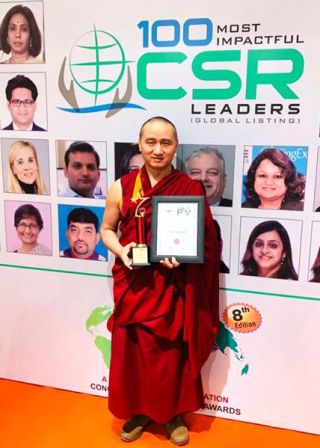
Geshe Tenzin Zopa with his award certificate and trophy, Mumbai, India, February 2019. Photo courtesy of Geshe Tenzin Zopa.
Geshe Tenzin Zopa shared his thoughts following the event.
If you were to ask me how I feel about this acknowledgment then I would answer with this: it is truly due to the blessing of my gurus and all the sentient beings’ immeasurable compassion and kindness towards me. When I got the invitation and information about this award, at first I thought it was a scam. I didn’t believe it right up until the booking of the flight, which was just a few weeks before I arrived in Mumbai from Sydney after my teaching tour.
In fact, until it was my turn to be called up to the stage I was still thinking, ‘I’m here for the conference only, not as a recipient of the award,’ because the people who went onto the stage for the awards were well-known great leaders of corporate social responsibility from around the world who have achieved great works, and I am not in that category at all.
Anyway, it was a very auspicious surprise. I was humbled to start the year knowing that in the larger non-Dharma community people are paying great attention, taking note of and appreciating one simple Buddhist monk, and are offering this award as acknowledgment, encouragement, and inspiration to work harder for the greater cause of peace and happiness of humanity to one’s best ability.
It was surprising and humbling to know that it still counted and was appreciated by many who love peace—as long as it is an effort for peace and harmony, even if it is coming from a nobody like me, who is no different from an ant.
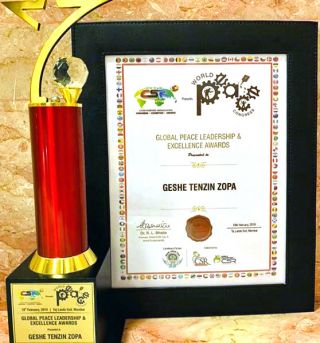
Geshe Tenzin Zopa’s award certificate and trophy, Mumbai, India, February 2019. Photo courtesy of Geshe Tenzin Zopa.
This event made me realize that the work I have been acknowledged for has not been done yet. But I pray to do these acknowledged works of peace for the happiness of humanity—unconditionally—for the rest of my life to the best of my ability, as long as it is the cause for the peace and happiness of humanity and all living beings. Whatever has happened and whatever is going to happen is all due to the blessings of the guru Buddhas and all mother sentient beings.
So, I pray and make aspirations for my life as Shantideva said, ‘For as long as sentient beings remain, may I too remain to dispel their sufferings.’
I sincerely dedicate this award and any virtuous deeds in relation to this event for the perfect health, long life, and fulfillment of all holy aspirations of His Holiness the 14th Dalai Lama, Kyabje Lama Zopa Rinpoche, and all the gurus. And also may it be the complete cause of temporary and ultimate happiness of all living beings.
This story was originally published by the FPMT Australia National Office.
Watch Geshe Tenzin Zopa deliver his speech at World Peace Congress on YouTube:
https://www.youtube.com/watch?v=3849tO9EbhE
FPMT.org and Mandala Publications brings you news of Lama Zopa Rinpoche and of activities, teachings, and events from over 160 FPMT centers, projects, and services around the globe. If you like what you read, consider becoming a Friend of FPMT, which supports our work.
- Tagged: Geshe Tenzin Zopa
10
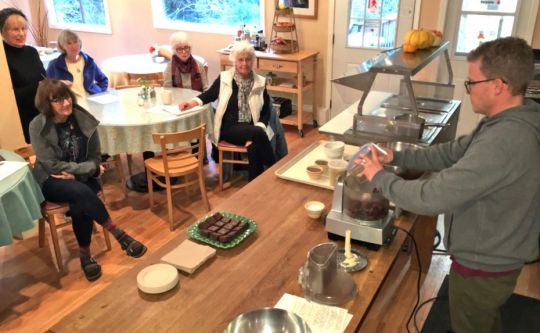
Mike Ditch giving a vegan brownie cooking demonstration during a Road Scholar retreat, Land of Medicine Buddha, Soquel, California, US, February 2019. Photo by Ven. Losang Drimay.
Land of Medicine Buddha (LMB), an FPMT center in Soquel, California, US, partners with the nonprofit Road Scholar program to offer retreats at LMB. Founded as Elderhostel in the summer of 1975, Road Scholar began as a learning program conceived to combine not-for-credit classes with inexpensive lodging for older adults. This partnership is an example of two of FPMT’s Five Pillars of Service: community service and revenue generation.
Breige Walbridge, LMB Road Scholar coordinator and qi gong and aromatherapy instructor, talks about working with Road Scholar in an interview conducted by FPMT registered teacher and LMB spiritual program assistant Ven. Losang Drimay.
Q: How long has LMB been offering Road Scholar retreats?
We started with two programs in 1996. When Murray Wright was the center director, someone suggested that Elderhostel would be a good match for LMB and a way to support the center. It offers programs that are beneficial and enhance people’s lives. So, LMB contacted the organization, who then came and checked out our facilities, looked at our program ideas, and a partnership was formed.
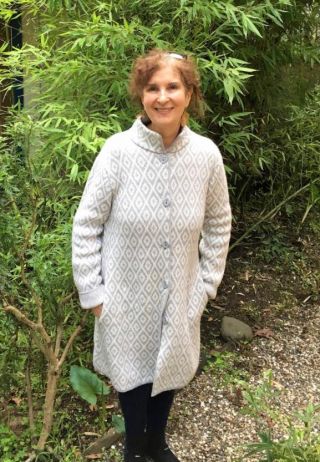
Breige Walbridge, road scholar coordinator at Land of Medicine Buddha, qi gong and aromatherapy instructor, Soquel, California, US, February 2019. Photo by Ven. Losang Drimay.
Q: Who actually manages the programs?
The coordinator at LMB comes up with ideas, presents it to Road Scholar, and Road Scholar handles the advertising and registration. I started working at LMB in 1999 as spiritual program coordinator (SPC). Elderhostel was then part of the spiritual program department. In 2000, the job was split off from SPC, and I became the Elderhostel coordinator. So this will be my twentieth year coordinating the Elderhostel/Road Scholar programs.
Q: How many Road Scholar retreats do you run in a year?
We have twelve to sixteen retreats in a year with several different themes. These days we are just running the three most popular themes, but we might be adding a new one next year. The current themes are Buddhist Insights into Living and Dying; Energy Massage and Qi Gong; Vegetarian Cuisine and Nutrition; Buddhist Thinking, Meditation and Qi Gong; and a Rejuvenation Retreat for Women. The Rejuvenation Retreats include meditation, qi gong, aromatherapy, and massage for self-care. In the longer version of the Rejuvenation Retreat we add herbs for vitality and yoga.
All the retreats include some extracurricular activities such as nature walks, music evenings, and a gompa tour. Sometimes we also have creating mandalas. The Rejuvenation Retreats for Women are four to five days. The co-ed programs are six days.
Q: How many people does it take to put on one Road Scholar retreat?
I do the administrative work and I’m the group leader. I have an assistant named Linda who helps with some of the administrative work and teaches one class. There are quite a few teachers: usually two meditation/Buddhism teachers, someone teaching qi gong (myself or another person), someone teaching massage, aromatherapy, yoga, nutrition, vegetarian cuisine, musicians, someone leads the nature walk, and more. For a recent six-day program, we had ten different teachers involved. Some of them just taught one class.
There are many topics and activities, sometimes including vegetarian cooking with our chefs, Stephanie and Mike. The teachers have great expertise in their field and are wonderful communicators. In addition to the Road Scholar faculty and administrators, the LMB staff provide a wonderful environment. LMB is all set up for housing overnight guests and serving delicious, fresh-cooked, vegetarian meals. We already have the whole hotel/conference center operation here. There is a supportive staff here providing care and comfort for the guests.

Mike Ditch, chef and cooking instructor for some of the Road Scholar retreats. Mike specializes in vegan and Vietnamese, Korean, and Japanese cuisines, Land of Medicine Buddha, Soquel, California, US, February 2019. Photo by Ven. Losang Drimay.
Q: What do people get out of it?
It’s a very enriching program. People learn a lot, get lifestyle tools that they can bring home with them, and get leads on things that they might follow up on when they get home. It can be life changing. The social aspect is an important element. Some people come here on the heels of some sort of loss, grief, or other difficult life situation. Participants make new friendships that they continue after they leave. They enjoy meeting like-minded people who also enjoy learning new things. The typical Road Scholar participant is intelligent, open-minded, and engaged. Road Scholar programs are for people age forty and older, but people who are forty or older can bring along someone younger.
In the last retreat, most participants were from out-of-state. Sometimes it’s about half from California and half from elsewhere. In general, people feel relaxed here and like the environment. They like the spiritual, peaceful atmosphere and the beauty of the redwood forest and nature. They feel that they are in a very special place. We have beautiful grounds. The accommodations are rustic, simple, and clean.
Q: How does the Road Scholar program fit in with the overall mission of LMB and our organization?
I feel very inspired by Lama Yeshe’s vision for Universal Education and often think of Lama and this vision when running the retreats. I also hope if Lama Zopa Rinpoche were looking at this program, he would be happy that it gives a lot of benefit. Several years ago, Rinpoche expressed to me that the two most important things were that people feel compassion from me and that they have a chance to see the holy objects. Feeling warmth and compassion from the wonderful staff here is an important part of the experience for the guests.
For more information about Land of Medicine Buddha, visit their website:
https://landofmedicinebuddha.org/
To learn more about Road Scholar:
https://www.roadscholar.org/about/
FPMT.org and Mandala Publications brings you news of Lama Zopa Rinpoche and of activities, teachings, and events from over 160 FPMT centers, projects, and services around the globe. If you like what you read, consider becoming a Friend of FPMT, which supports our work.
3
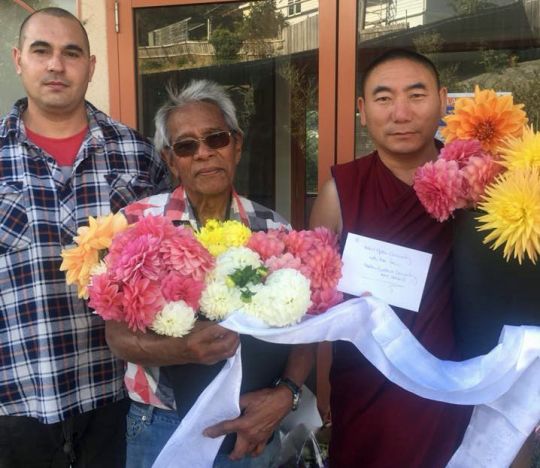
Ven. Lobsang Konchok with a son of the previous Imam and Andrew, Hobart Mosque, West Hobart, Tasmania, March 2019. Photo courtesy of Chag Tong Chen Tong Centre.
On March 18, 2019, three days after the Christchurch, New Zealand, shootings at Al Noor Mosque and Linwood Islamic Centre, members of Chag Tong Chen Tong Centre, an FPMT center in Hobart, Tasmania, Australia, visited their former home, Hobart Mosque in West Hobart, Tasmania. There, they greeted a son of the previous Imam and their old friend Andrew, a Hobart Mosque community member and full-time volunteer groundsman. Interfaith activities are one of FPMT’s five pillars of service. Ven. Lindy Mailhot, center director shares the story.
We visited the Hobart Mosque on March 18—offering freshly picked flowers from the gardens that surround the Chag Tong Chen Tong Centre (CTCT) gompa and extending our hearts, prayers, love, and care for our Muslim brothers and sisters on behalf of the CTCT Tibetan Buddhist community at this very tender time.
It was an especially moving experience for us to return and meet with our friends again at the Hobart Mosque. CTCT had enjoyed many years—some just part-time room rental, and then almost two-and-a-half years of full-time rental—of the eight-room Victorian house, which had been modified for use as a mosque. These modifications included beautiful religiously-themed stained-glass panels around the doorway. The Hobart Mosque community made their old mosque building available for rental after they built a bigger mosque on the same property in 2004.
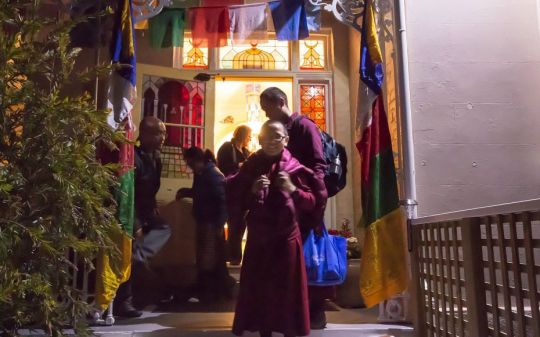
Tenzin Phuntsok Rinpoche and Geshe Tenzin Zopa outside of Hobart Mosque, West Hobart, Tasmania, August 2015. Photo by Chris Aimes.
We always shared a lovely harmony with the Hobart Mosque community. During our recent visit they told us how much they miss having our center community there with them since we relocated a couple of years ago due to our financial circumstances.
The Hobart Mosque is the venue where we welcomed the very first most precious, especially blessed and unforgettable two-day visit of Tenzin Phuntsok Rinpoche and Geshe Tenzin Zopa to CTCT in August 2015.
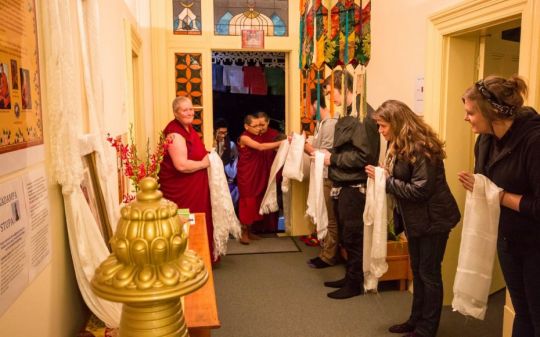
Tenzin Phuntsok Rinpoche and Geshe Tenzin Zopa entering Hobart Mosque, West Hobart, Tasmania, August 2015. Photo by Chris Aimes.
For more information about Chag Tong Chen Tong Centre, visit their website:
http://www.chagtong.org/
FPMT.org and Mandala Publications brings you news of Lama Zopa Rinpoche and of activities, teachings, and events from over 160 FPMT centers, projects, and services around the globe. If you like what you read, consider becoming a Friend of FPMT, which supports our work.
- Tagged: chag-tong chen-tong, hobart mosque, interfaith, interfaith pillar, ven. lindy mailhot, ven. lobsang konchok
27
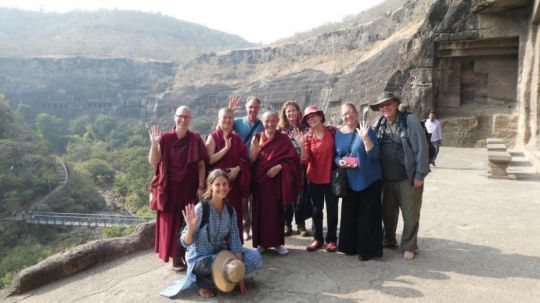
Ven. Ngawang Wangmo, Emily Coleing, Ven. Thubten Pema, Mark Reid, Geshe Ngawang Rabga, Drolkar Maree, Annie McGhee, Sharon Dobson, and Pierre Yves at Ajanta Caves, Maharasthra, India, December 2018. Photo courtesy of Pierre Yves.
In December 2018 a group of pilgrims organized by FPMT center Root Institute for Wisdom Culture in Bodhgaya, Gaya District, Bihar, India, traveled together to the Ajanta and Ellora Caves in Aurangabad District, Maharashtra, India, with Geshe Ngawang Rabga, Root Institute’s resident geshe. Trip leader Annie McGhee shares the story.
A group of nine of us left Root Institute early one morning to Delhi. It was very special to have Geshe Ngawang Rabga with us as part of our group of nine. He is extremely humble, knowledgeable, charismatic, gentle, warm, and incredibly kind. We spent the next day visiting the National Museum where a superb stupa holds relics of Shakyamuni Buddha. The museum also has many objects from the Dunhuang Caves of a Thousand Buddhas in Gansu Province, China.
We stayed two nights in Delhi, then after a short flight south to Aurangabad, we traveled by mini bus up to Ellora, where we stayed for several nights.
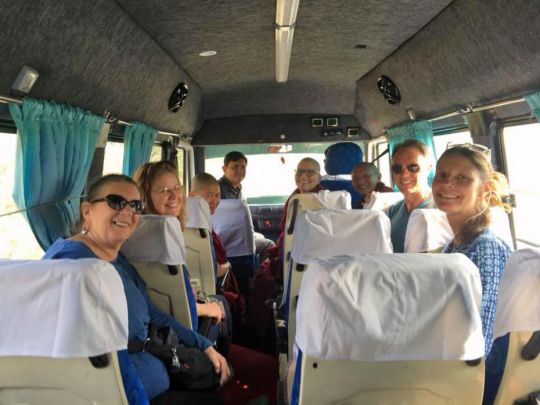
Mini bus ride over dusty bumpy roads, Maharasthra, India, December 2018. Photo by Pierre Yves.
Recognized as a World Heritage Site by UNESCO in 1983, the Ajanta Caves are some of the finest and most extensive surviving examples of ancient Indian art, architecture, and sculpture.
Only a few hours from the city of Aurangabad, twenty-nine immense caves are nestled in a huge gorge in the shape of a horseshoe. Dating from the second and first centuries B.C.E. to the fifth and sixth centuries C.E., the Ajanta Caves consist of viharas (monasteries) and chaitya (prayer halls) of different Buddhist traditions, which were carved into a 250 foot (76 meter) wall of rock.
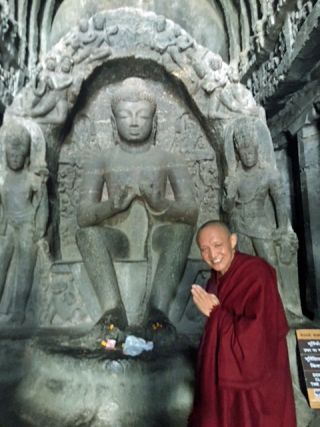
Geshe Ngawang Rabga at Ajanta Caves, Maharasthra, India, December 2018. Photo by Annie McGhee.
We saw cave walls and ceilings adorned with paintings. Among the most interesting paintings are the Jataka tales, illustrating diverse stories relating to the previous incarnations of the Buddha as various bodhisattvas.
We did prayers and meditated within the quiet solitude of some of the caves. There was a palpable feeling that these were indeed very holy and blessed places.
The next day we woke early to go to the Ellora Caves. They became a UNESCO site in 1983 and extend over one mile (two kilometeres).
The cave monasteries and temples at Ellora were dug out of the vertical face of a cliff. It is one of the largest rock-cut monastery-temple cave complexes in the world, featuring Buddhist, Hindu, and Jain monuments and artwork dating from 600 to 1,000 C.E. Each of the thirty-four excavated caves depict deities and mythology, and contain viharas and chaityas.
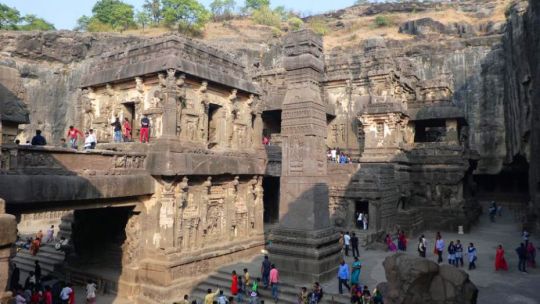
Hindu Kailasha temple at Ellora Caves, Maharashtra, India. December 2018. Photo by Pierre Yves.
Twelve of the Ellora Caves are Buddhist, with one featuring a superb Maitreya statue. We sat quietly at that cave, doing practices and contemplating the greatness of these caves and what they would have been like in their day.
These magnificent caves—unique in the history of humankind, as well as the extraordinary artwork and statuary, and what they represent—remain etched on my mind.
For more information about the Root Institute, visit their website:
http://www.rootinstitute.ngo/
FPMT.org and Mandala Publications brings you news of Lama Zopa Rinpoche and of activities, teachings and events from over 160 FPMT centers, projects and services around the globe. If you like what you read, consider becoming a Friend of FPMT, which supports our work.
- Home
- News/Media
- Study & Practice
- About FPMT Education Services
- Latest News
- Programs
- New to Buddhism?
- Buddhist Mind Science: Activating Your Potential
- Heart Advice for Death and Dying
- Discovering Buddhism
- Living in the Path
- Exploring Buddhism
- FPMT Basic Program
- FPMT Masters Program
- FPMT In-Depth Meditation Training
- Maitripa College
- Lotsawa Rinchen Zangpo Translator Program
- Universal Education for Compassion & Wisdom
- Online Learning Center
- Prayers & Practice Materials
- Overview of Prayers & Practices
- Full Catalogue of Prayers & Practice Materials
- Explore Popular Topics
- Benefiting Animals
- Chenrezig Resources
- Death & Dying Resources
- Lama Chopa (Guru Puja)
- Lama Zopa Rinpoche: Compendium of Precious Instructions
- Lama Zopa Rinpoche: Life Practice Advice
- Lama Zopa Rinpoche Practice Series
- Lamrim Resources
- Mantras
- Prayer Book Updates
- Purification Practices
- Sutras
- Thought Transformation (Lojong)
- Audio Materials
- Dharma Dates – Tibetan Calendar
- Translation Services
- Publishing Services
- Teachings and Advice
- Find Teachings and Advice
- Lama Zopa Rinpoche Advice Page
- Lama Zopa Rinpoche: Compendium of Precious Instructions
- Lama Zopa Rinpoche Video Teachings
- ༧སྐྱབས་རྗེ་བཟོད་པ་རིན་པོ་ཆེ་མཆོག་ནས་སྩལ་བའི་བཀའ་སློབ་བརྙན་འཕྲིན།
- Podcasts
- Lama Yeshe Wisdom Archive
- Buddhism FAQ
- Dharma for Young People
- Resources on Holy Objects
- Ways to Offer Support
- Centers
- Affiliates Area
- Teachers
- Projects
- Charitable Projects
- Make a Donation
- Applying for Grants
- News about Projects
- Other Projects within FPMT
- Support International Office
- Projects Photo Galleries
- Give Where Most Needed
- FPMT
- Shop
Subscribe to FPMT News
Translate*
*powered by Google TranslateTranslation of pages on fpmt.org is performed by Google Translate, a third party service which FPMT has no control over. The service provides automated computer translations that are only an approximation of the websites' original content. The translations should not be considered exact and only used as a rough guide.Proper guru devotion – correct devotion to your virtuous friends – allows you to actualize successfully all the steps of the path to enlightenment, from the perfect human rebirth up to buddhahood itself.








